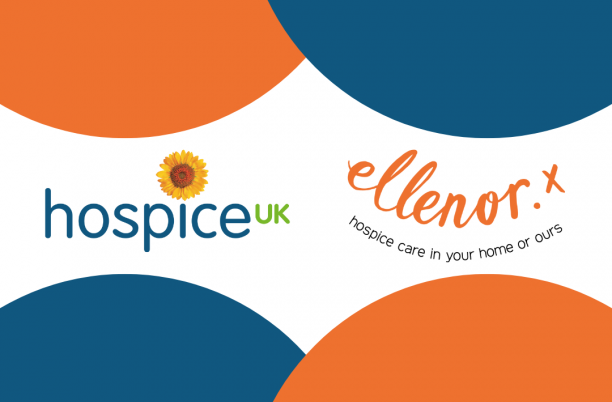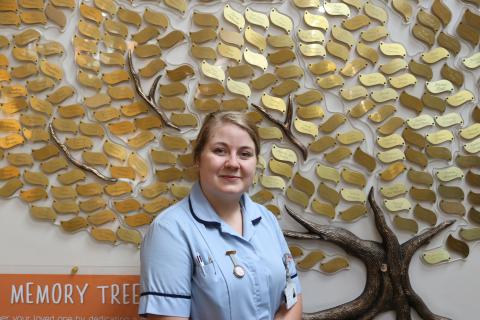

We look at how ellenor are working with patients, staff, friends and family to engage LGBTQ+ communities in conversations about hospice care.
ellenor provide hospice care for both adults and children across communities in North Kent and Bexley. Recently they’ve been focusing on equality, diversity and inclusion, designing a number of outreach programmes to engage with different communities, such as their local Sikh population or LGBTQ+ community, and other minority groups.
Originally through Hospice UK’s partnership with the Masonic Charitable Foundation (MCF, the freemasons’ charity), ellenor received £30,000 to hire a new member of staff focusing on equality, diversity and inclusion for staff, patients and volunteers.
They have developed this role and now fully fund this project as part of their work to help ensure that inclusive hospice care is available for everyone in the area.
Creating an open culture
Part of their work has been to find out who their communities are comprised of, within North Kent and Bexley.
They have been engaging with local communities, running surveys to explore demographics in their area and continuing to develop an open culture within the hospice.
A key element of the latter is the strategic engagement with staff, patients and loved ones who are part of LGBTQ+ communities. This not only helps educate and shape the future of ellenor hospice, but encourages a much more open culture.
Anna Willson, Project Consultant at ellenor hospice said:
“We engage with LGBTQ+ communities in a number of ways.
“Equality, Diversity and Inclusion is quite a new thing for us as a hospice but we’ve managed to get a lot of traction and momentum, certainly over the past 6 to 12 months.
“Engagement with LGBTQ+ communities is about getting out there, getting visible, reaching out to the organisations that support these communities in our area.
“We’ve reached out to the people who run our two local pride marches and taking part helps us build trust and understand how we can support them.”

"I think it is so important to let people know they are welcome and we are non-judgemental so they can open up to us.
"If people feel they need to hide a crucial part of themselves, I don’t think we can reach the level of trust we would like to."
Vicki – ellenor Hospice Nursing Staff
Why is this engagement important?
To provide everyone who needs it with the best care possible, hospices have to offer support that takes into account personal preferences. They must understand the barriers that may face people and tailor support to meet an individual’s needs.
People from LGBTQ+ communities may face unique barriers to accessing care, and ellenor know that to truly understand and overcome these barriers they need to establish trust within LGBTQ+ communities.
Anna Willson commented:
“Trust is something that is built over a period of time.
“We have some really keen advocates from LGBTQ+ communities who are helping us bridge that gap and get out there.
“This is a relationship we are building – to build trust you have to show up consistently, and that is essentially what we are trying to do.”
ellenor recently hosted a podcast to discuss death, dying, bereavement, care and the barriers that exist when accessing care. This took place with LGBTQ+ people from within the hospice and the wider community.
Anna Willson added:
“The thing I’m most proud of is our podcast - it is the first podcast ellenor hospice has done and it was LGBTQ+ specific.
“So much insight came out of the podcast and the reach has been amazing, not just from staff but externally too.”
How can we make hospices more inclusive?
Anna Willson, Project Consultant at ellenor hospice gives advice on how to make a hospice a more inclusive environment.
How can we make hospices a more inclusive environment?
Creating a truly inclusive environment takes time and is not something that can be solved overnight.
One of the first steps ellenor took is to make sure LGBTQ+ members of staff feel comfortable enough to be who they are while at work.
Alongside this, ellenor recently launched an open survey to help understand what death, dying and bereavement means to different communities across North Kent and Bexley.
This survey will not only help their work with LGBTQ+ communities but also with their wider work on equality, diversity and inclusion. The insights from the survey will help shape ongoing training and education for staff and volunteers.
Anna Willson said:
“The advice I would give to hospices who are starting this journey and are looking to engage with LGBTQ+ communities is reach out to local organisations - definitely reach out to your local pride and do your research nationally.
“The information is out there and it can help build a great foundation. Then go out engaging with people locally.”
ellenor continue to engage with their local communities and workforce to discover what matters to them, while promoting a completely inclusive environment.
